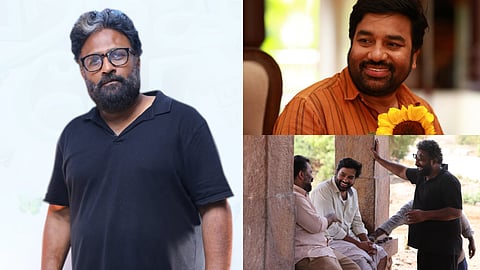

With every film of his being a deep, socio-political, philosophical musing, what could have prompted director Ram to come up with a breezy slice-of-life adventure like Paranthu Po? The director takes a pause and, after a long reflective inhale, he says, “Well, JioHotstar wanted me to make a ‘happy’ film.” But that doesn’t mean he was going to make a surface-level crowd-pleaser based on a corporate prompt. “I asked myself what the word 'happy' meant for the world at large and for me as a person, at this juncture in my life. I asked myself a lot of questions about happiness and eventually arrived at the foundations of Paranthu Po. It didn’t give me the story but the genre of this film,” Ram elaborates on the thematic foundations of his recent release. He describes the film as his attempt to “fly away from my film language, my fixations, and my belief systems.” Paranthu Po is undoubtedly a stark tonal departure from Ram’s earlier works, but it is still a reflection on the ever-present tension between the modern societal structure and our relentless pursuit of happiness and struggle to savour our sense of wonder.
While non-conformist ideals are an unmissable part of Ram’s films, he is careful to add a healthy dose of pragmatism as well. “Every bird that takes off must come down eventually because even the act of flying has its own rules, like how far and how long you can fly.” This rationale seems to be the foundation of his quest to reinvent himself with Paranthu Po, as he breaks down the self-imposed rules for ‘flying away’ from his typical filmmaking style. “I wanted to keep this film simple. I didn’t want to have silhouettes, high-speed shots, cut-aways, inserts, and wanted the close-ups to be minimal. Also, I didn’t want to underline the emotions. I wanted them to rest like a rock on the bottom of a pond,” he cannot resist being poetic even as he dissects technicalities. The most important decision the filmmaker says he took is to “let go of the creator’s ego.” Ram says, “Between directing and observing, I chose to observe the scenes as they unfolded and resisted the urge to intervene and guide the flow of the scene too much. I just told them how the scene goes and sat back and watched.”
Ram’s tonal departure extended to the casting as well. How would Shiva, who is known for comedic roles, fit in Ram’s world? This question dominated the discourse around Paranthu Po’s pre-release promotions. It abruptly vanished after the film’s release. “I wanted the film to be unhurried, but that doesn’t mean I wanted it to be slow. I wanted to see the world through a ten-year-old boy’s energy and childlike innocence, and I wanted his parents to reflect that as well. That is why I chose both Shiva and Grace Antony. They can effortlessly play an adult who is also a child at heart,” says the director. The Ram-Shiva friendship goes way back. They both started their journey into the film industry at the same time, as both Kattradhu Thamizh and Chennai 600028 were released in 2007. As someone who successfully allayed fears of his reinvention with Paranthu Po, Ram further questions audiences' preconceived notions based on a director’s previous work and how we divide mainstream and arthouse films. He says, “You look at Easy Rider (1969) or Pulp Fiction (1994), both won awards at the Cannes Film Festival. But we don’t call them ‘festival films’. Those films, when they came out, had a unique voice. Not many films had that editing pattern, rhythm, dialogue, or spoke about such themes at that time. That is what sets them apart.” He then gives a contemporary example from Tamil cinema, “The yet-to-release Bad Girl, which won the NETPAC award at Rotterdam (International Film Festival Rotterdam), is a mainstream film. Not every film that enters a film festival is an arthouse film. There is no such thing as a festival film.”
Paranthu Po is Ram’s fifth film to enter the Rotterdam Film Festival after Kattradhu Thamizh (2007), Taramani (2017), Peranbu (2019), and Yezhu Kadal Yezhu Malai. Ram then begins to reminisce about his directorial debut. “Kattradhu Thamizh was first titled Hindi MA. I was assisting director Rajkumar Santoshi at the time, and he was supposed to write the dialogues for the film. And then it changed to Tamil MA and then to Kattradhu Thamizh.” Reflecting on the evolution of cinema in the last two decades, Ram feels optimistic about the direction the industry is growing towards. “I am happy that filmmaking has become democratised and now anybody can make an international film and send it to festivals across the world.” To those who think the refreshing optimism in Paranthu Po is in stark contrast to the angst in his directorial debut, Kattradhu Thamizh, Ram says, “I think Kattradhu Thamizh is a hopeful film. Art can’t be pessimistic, but it can be brutal. Just because a film is truthful and brutally honest, doesn’t mean it is pessimistic.” He then talks about how Russian novelist Fyodor Dostoevsky deeply influenced his works. “I think there is a difference between reading Dostoevsky’s White Nights as an 18-year-old and then as a 40-year-old. Maybe if you revisit now, you will see Kattradhu Thamizh as a hopeful story about old lovers reuniting through magical coincidences.” Ram then concludes the conversation with a book recommendation. “Please read Dostoevsky’s The House of the Dead if you haven’t already.”